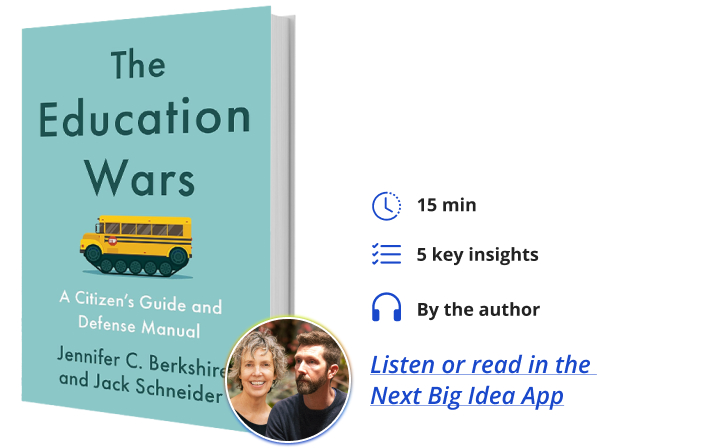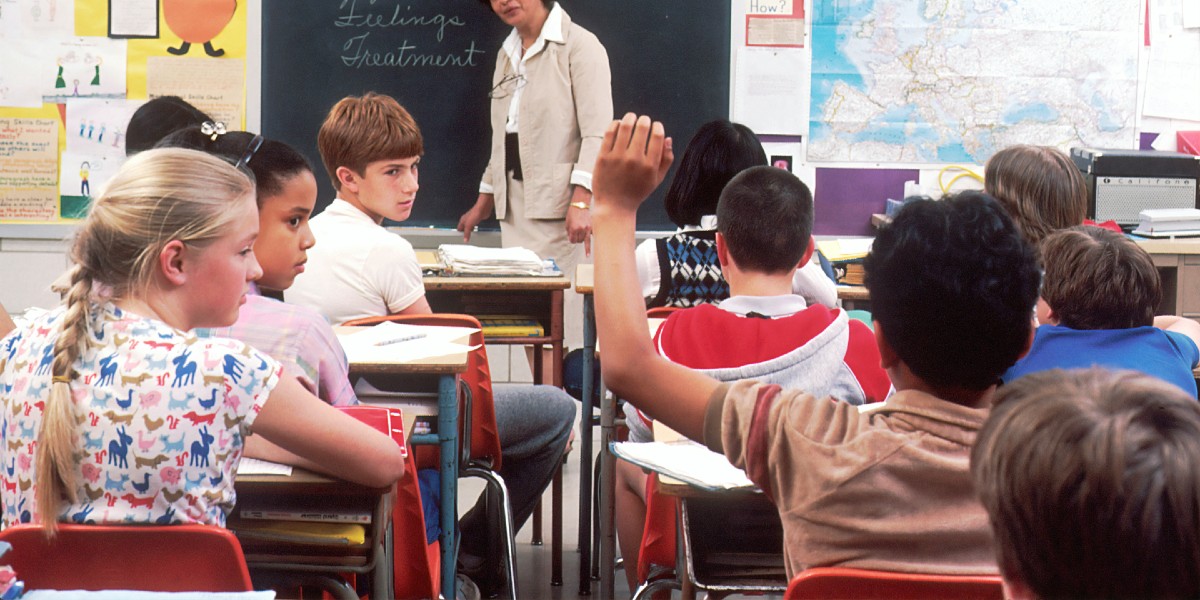Jennifer Berkshire is a freelance journalist and host of the education podcast Have You Heard. She teaches in the Boston College Prison Education Program.
Jack Schneider is the Dwight W. Allen Distinguished Professor of Education at the University of Massachusetts Amherst, where he directs the Center for Education Policy.
Below, co-authors Jennifer and Jack share five key insights from their new book, The Education Wars: A Citizen’s Guide and Defense Manual. Listen to the audio version—read by Jennifer and Jack—in the Next Big Idea App.

1. We have been fighting about schools for a long time.
There’s nothing new about Americans fighting over schools. Schools are how we advance our values as a society. They are how we advance opportunities for individuals. They’re also where we disagree about matters like what kind of history should be taught or the role of religion in schools.
One doesn’t have to look far into history to find culture wars in schools that seemed as if they would engulf public education entirely but never did. We can look back to the Cold War or a little bit earlier to fights over evolution. We can study the rise of the public education system when there were arguments about whether the Protestant Bible should be used and who should be allowed into schools.
Over time, however, we’ve found that these disagreements have largely resolved themselves through democratic processes and an underlying faith in public education.
2. We’re fighting over schools today because we’re fighting about everything.
We’re incredibly polarized into warring camps of red and blue, and our faith in all kinds of institutions is way down. The intersection of polarization and mistrust has caused us to view education and the quality of public schools through a partisan lens. If you’re a Democrat, you’re far more likely to have confidence in our schools than if you’re a Republican.
Another key reason we’re fighting so intensely over schools right now is that we no longer agree on what the point of education is. If we climb into time machines and go back a couple of hundred years, the purpose of public education was clear. If our self-governing democracy was going to survive, then we needed schools that could produce democratic citizens. Over the past 30 years, we settled on a different and much narrower purpose: workforce preparation. The point of school is to prepare kids for work. However, now we’re in a moment of intense disagreement over the why of K-12 education.
“Another key reason we’re fighting so intensely over schools right now is that we no longer agree on what the point of education is.”
Do we want schools that train young patriots? Or is it better for kids to learn the whole story of America, warts and all? Should schools teach kids to think for themselves, or should they pass along the culture and values parents consider most important? These are all big questions, and we don’t agree on the answers to any of them.
3. This time, our fights over schools are different.
This time, we’re fighting about whether we should have a public education system at all. Prior culture wars in schools and disagreements about what schooling should look like fundamentally accepted the premise of public education. That’s why more than 90 percent of American school-aged children are enrolled in public schools. Americans like their public schools, but there’s a different idea lurking beneath today’s culture war.
It’s a radical idea that was advanced roughly half a century ago by free-market economist Milton Friedman. The idea was that instead of funding schools with tax dollars and allowing any child in the neighborhood to attend, we should provide vouchers to families, and schools would operate largely on a free market model. Eventually, those vouchers would be reduced in value, and people would pay largely out of pocket for the education they wanted their children to receive. It’s a vision that had very little political support. In fact, a highly popular president, Ronald Reagan, who was himself an acolyte of Milton Friedman’s, advanced the idea in the 1980s and found that it was so politically unpopular that he moved on to other pursuits—like firing the nation’s air traffic controllers.
Since then, an ideologically committed core of policy elites has been working to lay the groundwork for this present moment. They built policy power and a legislative apparatus, and most importantly, they built bipartisan consensus with the Democratic Party, often unwittingly, around the idea that Americans should embrace choice in public education and that the main mission of public education is advancing an individual’s choice.
Supporters of choice in the Democratic Party saw policy alternatives, like charter schools, as a kind of lasting peace. However, the ideologically committed policy elites on the right (like Donald Trump’s Secretary of Education, Betsy DeVos) saw this as a way station to the long-term aim of private school vouchers and a fully marketized education system—a system in which there would be no system at all, but only, as DeVos put it, “dollars in the backpack.”
4. If we lose public education in this country, we’re not getting it back.
Imagine a candidate for office running on a platform of universal free public schools from kindergarten through 12th grade—schools that everyone can go to, no matter their skin color, whether they have a disability, or even whether they’re a U.S. citizen. Oh, and we’re going to tax ourselves to pay for this system. Imagine the reception that the candidate would get. I’m guessing that person would be called a socialist or something worse.
If the stakes are so high, why does it seem so hard to defend public schools? Well, that’s because our expectations of what schools should do are really high. We want them to solve huge systemic problems like poverty and inequality. Our outsized expectations for what schools can do lead to outsized disappointment when they fail to deliver. Think about how often you’ve heard some version of this argument:
The system is failing. It’s getting worse every year, and we’re falling behind other countries. Better to just wash our hands of the whole thing.
Beating up on public schools has been practically a national pastime ever since a landmark Reagan-era report called A Nation at Risk warned that a rising tide of mediocrity was overtaking our schools.
“Our outsized expectations for what schools can do lead to outsized disappointment when they fail to deliver.”
Today, the narrative that schools are failing is practically a religion, and the conviction that public education is a failure makes it hard for us to acknowledge that public education is one of the great American success stories. The entire project of free, taxpayer-supported, democratically run public schools hangs in the balance, and with it, any possibility that we’ll realize the potential of a multiracial democracy. And yet, people aren’t pouring into the streets in outrage. After a half-century of beating up on the schools, we have a hard time making the case that public schools are worth saving.
5. If we want to protect and preserve public education, we can’t fight fire with fire.
Ultimately, there is no way to win the culture war. The culture war is designed to sow seeds of distrust and resentment, and that’s a part of the political plan. If you want to sell something like private school vouchers to Americans, the lesson over time has been to don’t do it directly. Whenever private school vouchers have been on the ballot, they’ve lost.
If you can sow seeds of distrust and resentment and convince the American people that the public schools that they have supported for so long have gone off the rails, if you can convince them that their tax dollars are being misused by public schools in the form of things like indoctrination, then maybe it no longer makes sense to continue carrying out this experiment of the past century and a half.
The culture war, in that sense, is just a means to an end. Engaging in it in any way advances the further purpose of privatizing education. The way to fight fire isn’t with fire. It’s with fire extinguishers. We end our book by talking through what Americans can do to advance the democratic aims of public education: build broad-based bipartisan coalitions in support of public schools, reclaim the public mission of schooling, and fully embrace the public mission of schooling.
To listen to the audio version read by co-authors Jennifer Berkshire and Jack Schneider, download the Next Big Idea App today:































